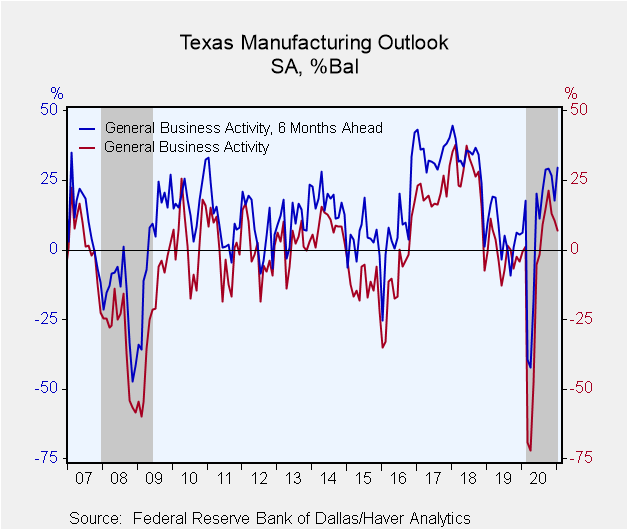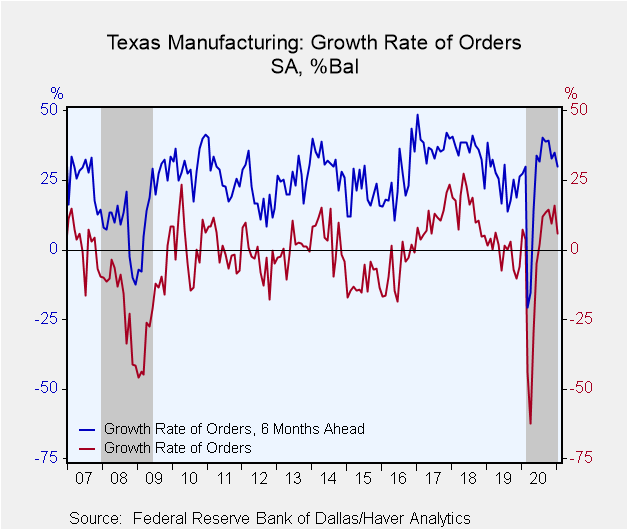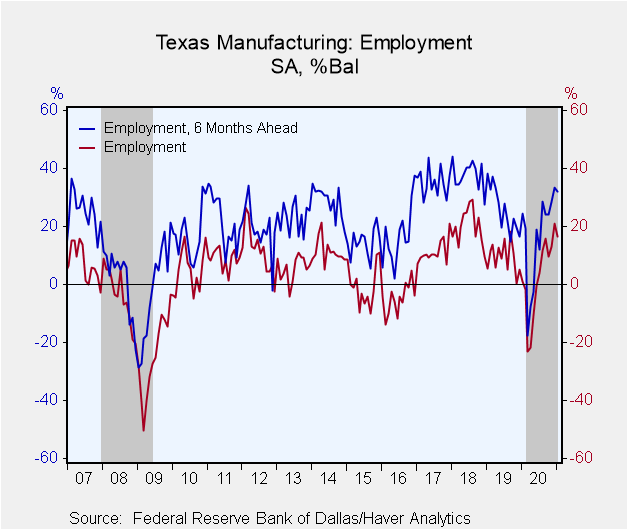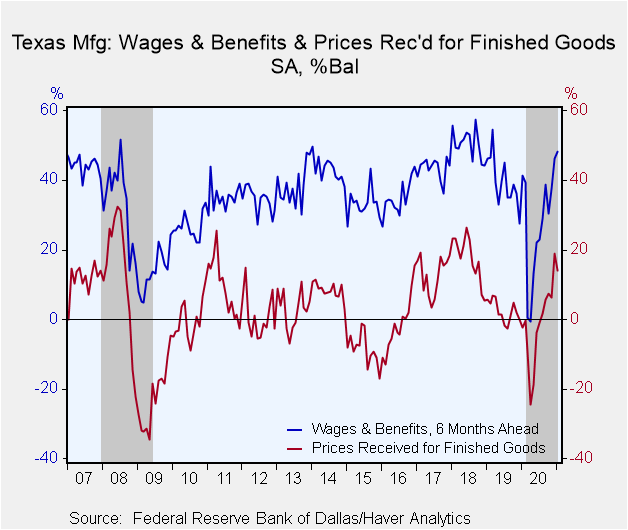 Global| Jan 25 2021
Global| Jan 25 2021Texas Manufacturing Activity Weakens Further During January
by:Tom Moeller
|in:Economy in Brief
Summary
• General business conditions deteriorate to six-month low. • Weakening is broad-based amongst subindexes. • Expectations reading improves. The Federal Reserve Bank of Dallas reported that its Texas Manufacturing Outlook Survey [...]
• General business conditions deteriorate to six-month low.
• Weakening is broad-based amongst subindexes.
• Expectations reading improves.
The Federal Reserve Bank of Dallas reported that its Texas Manufacturing Outlook Survey General Business Activity Index fell to 7.0 during January from 10.5 in December, revised from 9.7. The index was below its October high of 21.2. Data were collected from January 12-20.
The production measure fell sharply to 4.6 from 26.8, its lowest point since May. A greatly lessened 27% of respondents reported an increase in production in January while an higher 23% reported a decline. The new orders growth measure fell sharply to 5.9, a six-month low. The shipments reading weakened to 13.5 from a December high of 23.4, while the unfilled orders measure fell moderately.
The employment reading declined to a still-strong 16.6 in January from 20.9 in December. A lessened 27% of respondents reported increased hiring while a fairly steady 11% indicated a decline. The wages and benefits also eased to 17.6, but it remained near the recent high.
The prices received measure eased to 13.9 in January after strengthening in December to its highest reading since July 2018. More than 20% of respondents reported receiving higher prices while seven percent indicated a decline. The raw materials price measure surged to 55.0, up from -21.2 nine months ago.
The headline index of expectations for overall business activity rebounded and was just below its October 2018 high. Most of the subindexes deteriorated, however, including production, new orders growth and employment. Nevertheless, expectations for wages & benefits improved to the highest level since March 2019. Capital spending expectations remained firm.
Each index is calculated by subtracting the percentage reporting a decrease from the percentage reporting an increase. When all firms report rising activity, an index will register 100. An index will register -100 when all firms report a decrease. An index will be zero when the number of firms reporting an increase or decrease is equal. Data for the Texas Manufacturing Outlook can be found in Haver's SURVEYS database.
| Texas Manufacturing Outlook Survey (SA, % Balance) | Jan | Dec | Nov | Jan '20 | 2020 | 2019 | 2018 |
|---|---|---|---|---|---|---|---|
| Current General Business Activity Index | 7.0 | 10.5 | 12.9 | -0.5 | -10.6 | -1.2 | 25.8 |
| Production | 4.6 | 26.8 | 8.7 | 11.2 | 3.7 | 8.9 | 21.4 |
| Growth Rate of New Orders | 5.9 | 15.9 | 9.3 | 7.4 | -5.3 | -1.1 | 14.8 |
| Employment | 16.6 | 20.9 | 13.0 | 1.1 | 1.6 | 9.5 | 20.0 |
| Wages & Benefits | 17.6 | 19.6 | 14.0 | 15.1 | 11.5 | 23.5 | 29.7 |
| Prices Received for Finished Goods | 13.9 | 19.0 | 6.2 | -2.4 | -1.7 | 2.5 | 17.6 |
| General Business Activity Index Expected in Six Months | 29.6 | 17.8 | 26.7 | 6.2 | 6.6 | 6.4 | 31.6 |
| Production | 43.7 | 47.3 | 40.9 | 38.9 | 31.3 | 35.6 | 48.6 |
| Growth Rate of New Orders | 29.8 | 34.9 | 37.6 | 27.2 | 23.9 | 25.2 | 35.8 |
| Employment | 31.9 | 33.4 | 28.6 | 24.4 | 15.5 | 26.0 | 37.7 |
| Wages & Benefits | 48.3 | 46.2 | 37.6 | 41.3 | 26.7 | 39.7 | 50.4 |
Tom Moeller
AuthorMore in Author Profile »Prior to joining Haver Analytics in 2000, Mr. Moeller worked as the Economist at Chancellor Capital Management from 1985 to 1999. There, he developed comprehensive economic forecasts and interpreted economic data for equity and fixed income portfolio managers. Also at Chancellor, Mr. Moeller worked as an equity analyst and was responsible for researching and rating companies in the economically sensitive automobile and housing industries for investment in Chancellor’s equity portfolio. Prior to joining Chancellor, Mr. Moeller was an Economist at Citibank from 1979 to 1984. He also analyzed pricing behavior in the metals industry for the Council on Wage and Price Stability in Washington, D.C. In 1999, Mr. Moeller received the award for most accurate forecast from the Forecasters' Club of New York. From 1990 to 1992 he was President of the New York Association for Business Economists. Mr. Moeller earned an M.B.A. in Finance from Fordham University, where he graduated in 1987. He holds a Bachelor of Arts in Economics from George Washington University.










